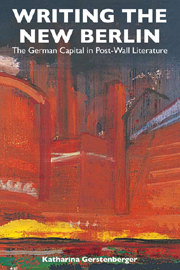Book contents
- Frontmatter
- Contents
- Acknowledgments
- Introduction: Newness and Its Discontents: Berlin Literature in the 1990s and Beyond
- 1 Erotic Sites: Sexual Topographies after the Wall
- 2 Bodies and Borders: The Monsters of Berlin
- 3 Multicultural Germans and Jews of Many Cultures: Imagining “Jewish Berlin”
- 4 Goodbye to East Berlin
- 5 Looking for Perspectives: The Construction at Potsdamer Platz
- Conclusion
- Bibliography
- Index
Conclusion
Published online by Cambridge University Press: 05 February 2013
- Frontmatter
- Contents
- Acknowledgments
- Introduction: Newness and Its Discontents: Berlin Literature in the 1990s and Beyond
- 1 Erotic Sites: Sexual Topographies after the Wall
- 2 Bodies and Borders: The Monsters of Berlin
- 3 Multicultural Germans and Jews of Many Cultures: Imagining “Jewish Berlin”
- 4 Goodbye to East Berlin
- 5 Looking for Perspectives: The Construction at Potsdamer Platz
- Conclusion
- Bibliography
- Index
Summary
Nach New York wollte auch Elmar gerne.
“Kein friedlicher Ort, schätze ich.”
“Nee,” meinte er, “das ist klar, das ist nicht Berlin.”
[Elmar too would have liked to visit New York.
“Not a peaceful place, I guess.”
“Nope,” he said, “that much is clear, it is not like Berlin.”]
— Ralf Bönt, “Berliner Stille”After more than a decade of transition following the wall's fall, Berlin has assumed its political and representative function as united Germany's capital. The rebuilt city projects completeness and attainment. Its strategy of investing millions into historical as well as new architecture, most notably museums and a new government quarter, but also to promote commerce and entertainment, has paid off, placing Berlin firmly on the international tourist map. The 2006 Soccer World Cup showcased Germany as a hospitable nation and conveyed Berlin's image as a welcoming and cosmopolitan city. Berlin, by these standards, has approximated the self-image it constructed for itself in the 1990s.
Berlin literature of the post-wall period is linked to the unification process. As this process nears its end, so does 1990s Berlin literature. The stark decline in texts that bear the stamp of the first post-wall decade confirms that fifteen years after the wall's opening Berlin is no longer the transitional city of the 1990s. Writers, as well as readers and critics, no longer privilege Berlin as an exemplary site to understand and to commentate on united Germany. This focus on the present seen through the lens of one city has now been usurped by broader historical and geographical concerns.
- Type
- Chapter
- Information
- Writing the New BerlinThe German Capital in Post-Wall Literature, pp. 170 - 176Publisher: Boydell & BrewerPrint publication year: 2008

